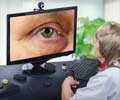The team will also work to enhance the security of the systems used in the process, thereby reducing the possibility of identity theft and cyber-terrorism. The effort is being supported by a $400,000 grant from the National Science Foundation’s Cyber Trust Program. Hu, the principal investigator, will collaborate with Yang Xiao, professor of computer science at the University of Alabama.
“Telemedicine technology can greatly increase the quality of medical care while also decreasing health care costs,” notes Hu. “Through this project we hope to increase the integration of RFID into existing cardiac sensor networks, ensure the overall security of the system and promote the implementation of the technology in nursing homes and adult care facilities across the country.”“This research will advance an important technology development, while also enhancing RIT’s skills and capabilities in the area of computer engineering and design,” adds Andreas Savakis, chair of RIT’s Department of Computer Engineering.
A new wireless technology for telemedicine delivery to advance the integration of radio frequency identification technology, also known as RFID, into cardiac sensor networks, have been found by a team of researchers led by Fei Hu, assistant professor of computer engineering at Rochester Institute of Technology.
The United States’ growing nursing home and long-term care populations are putting a severe strain on the national health care system, in part due to the costs of medical care and doctor visits to these facilities. Cardiac sensor networks use wireless sensors to remotely monitor a patient’s heart beating pattern and blood pressure and transfer this information to doctors and hospitals off site.
According to Hu, they are seen as a major avenue for increasing the quality of diagnosis and reducing the need for medical supervision. One of the major roadblocks in the further development of the system has been concern over the security of wireless networks used in telemedicine delivery. Hu and Xiao will research the use of anti-interference technology to reduce radio distortion of these networks and design and test new RFID security schemes that will decrease the chance of information being stolen. They will also look to assist the overall implementation and integration of RFID to further the development of this technology in telemedicine systems.
“There are well known security challenges associated with cardiac sensor networks and RFID,” Hu notes. “It is my hope this research will assist in better protecting these systems and allow greater numbers of doctors and patients to take advantage of the benefits of telemedicine.”
Advertisement
Source-Eurekalert
SPH/C









